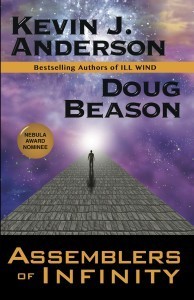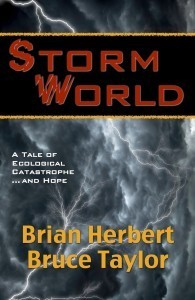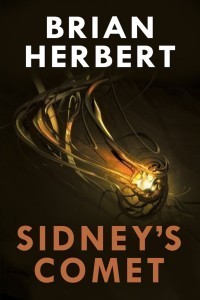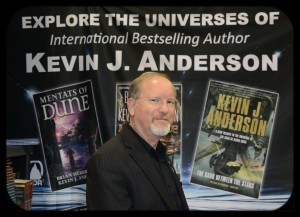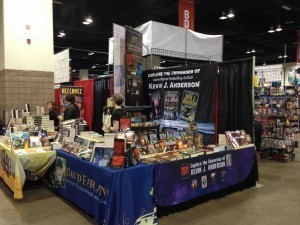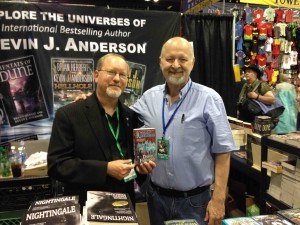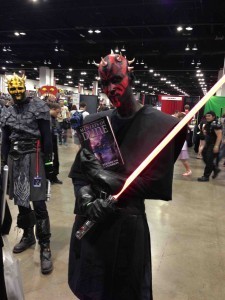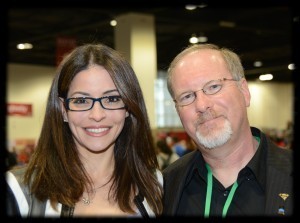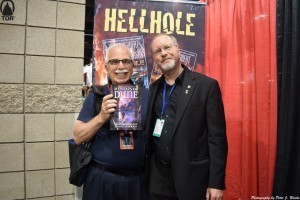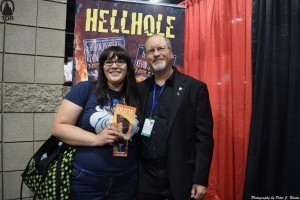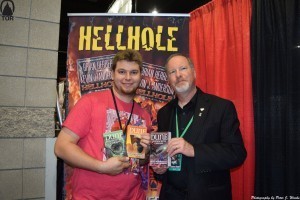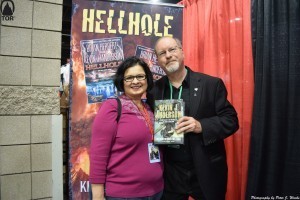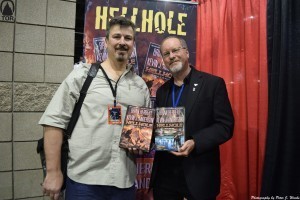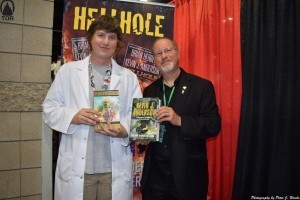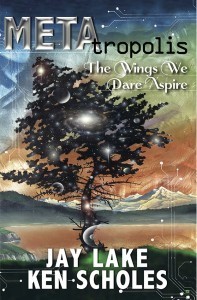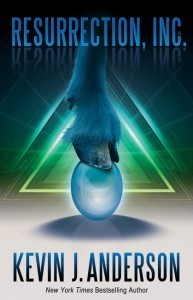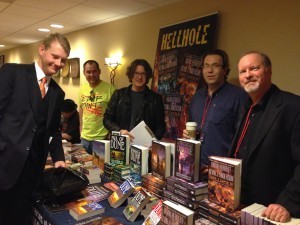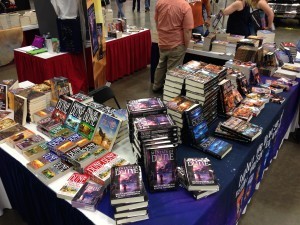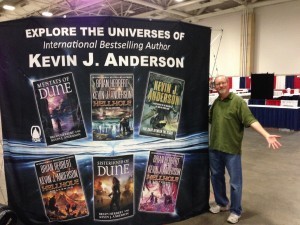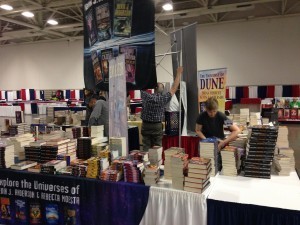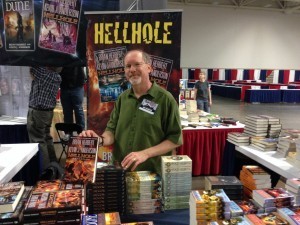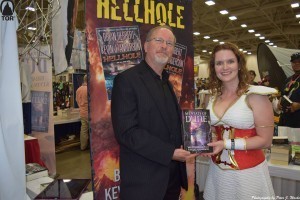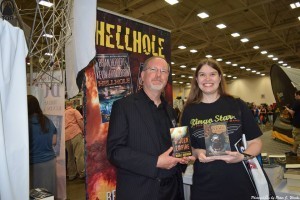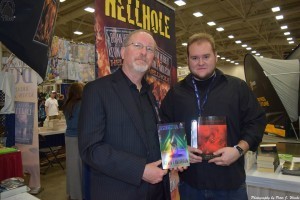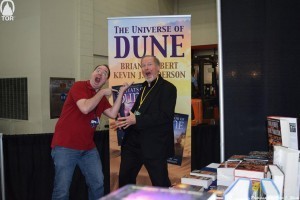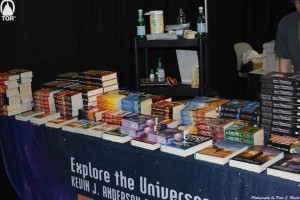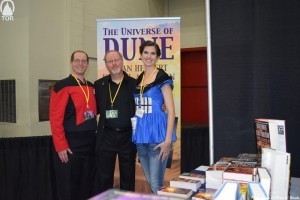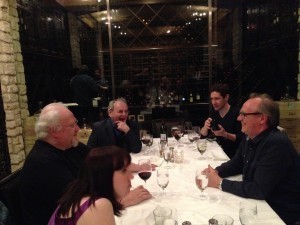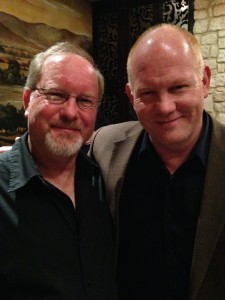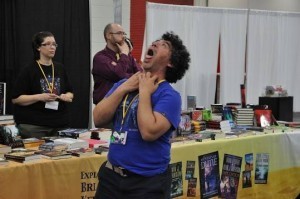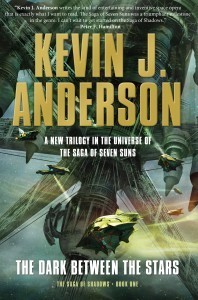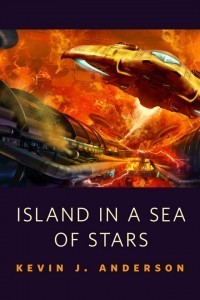Kevin J. Anderson's Blog, page 3
July 1, 2014
Teaser Tuesday: ASSEMBLERS OF INFINITY
Here’s a taste of my Nebula-nominated hard-SF novel cowritten with Doug Beason, ASSEMBLERS OF INFINITY—alien nanotechnology and a disaster on the Moon! ASSEMBLERS is also featured as one of nine science fiction books in the Cosmic SF Bundle currently running (for one more week!) on storybundle.com
The crew of Moonbase Columbus make an amazing discovery on the far side of the Moon—a massive alien structure is erecting itself, built up atom by atom by living machines, microscopically small, intelligent, and unstoppable, consuming everything they touch. The mysterious structure begins to expand and take shape, and its creators begin to multiply.
Is this the first strike in an alien invasion from the stars? Or has human nanotechnology experimentation gone awry, triggering an unexpected infestation? As riots rage across a panicked Earth, scientists scramble to learn the truth before humanity’s home is engulfed by the voracious machines.
daedalus array: lunar farside
For all practical purposes, Daedalus Crater was the most remote spot in the solar system. Centered 180 degrees away from Earth and only 4 degrees below the lunar equator, Daedalus never saw or heard Earth, never received stray radio waves that might diffract over the lunar horizon and ruin delicate astronomical measurements.
Here in the orbital shadow, Daedalus Crater was the perfect spot to station a VLF—Very Low Frequency—array to study portions of the radio spectrum that on Earth were drowned out. Massive dipole antennas sprawled kilometers across the flat floor of the crater in a Y-shaped array encircled by the crater walls, making the site look like a giant Mercedes-Benz emblem.
Because of its remoteness, the VLF site had to function autonomously. All instruments had been designed to run by themselves, to fix themselves with modular replacement parts, to be inspected by telepresence repair drones. With the unchanging nature of the Moon, the VLF should have operated for decades without human intervention.
Until absolutely everything went wrong.
Trevor “Can’t Wait” Waite drew a stale breath from the cramped cabin of the lunar hopper as they approached the site. The hopper had been launched from Moonbase Columbus on an investigation and repair mission, and Waite fidgeted until he could go outside and have a look for himself. The scientists Earthside were screaming about their interrupted VLF data, and Can’t Wait Waite could troubleshoot faster than anyone else on the base.
Unfortunately, even with ninety-five percent of the hopper’s systems automated, outdated safety regs still demanded a full crew of three, with one person to remain inside the vehicle and two required on every extravehicular activity. Waite figured he could have taken care of the problem himself in an hour or so; he was convinced that Sig Lasserman’s caution and Becky Snow’s neophyte bumbling would triple the time required.
The hopper approached the lunar surface on the upper rim of Daedalus Crater. It was difficult to see in the lunar night. “I am taking her down slowly,” Siegfried Lasserman said. He spoke in a clipped German accent as he worked at the lander controls.
“Of course you are,” Waite mumbled. He checked over his suit, anxious to be outside and tinkering with the malfunctioning antennas. Let’s get the show on the road!
He hated to waste time sending a human to do a robot’s job, but all the automatic sensors on the VLF had gone screwy, all the maintenance routines had failed, and no one could figure out just which branch in the endless fault-tree had been responsible for the breakdown. Two of the array’s dipole antennas had blipped out within an hour of each other; a third quit less than a day later. The three defective units stood in a row, possibly signifying that the malfunction was spreading sequentially. And even worse, the repair drones would not respond.
Moonbase Columbus couldn’t even get a visual of the Daedalus site. Waite wondered if something as major as a meteor strike could have wrecked a portion of the array—but all the seismic sensors had been silent as fossils.
“Why is he setting us down up here?” Becky Snow asked, interrupting Waite’s thoughts. “This wasn’t briefed in the preflight.” Her black eyes were wider than they should have been; perspiration glistened on her ebony cheeks and forehead.
Lasserman’s attention didn’t waver from the controls. “To protect the array from any dust the hopper will kick up. The upper rim of the crater has an access road down to the floor. We’ll be close enough up here.”
“You’ll see the array even in the darkness once we’re down the access road,” Waite said. Becky Snow had never been to the Farside before and had been on the Moon itself only five weeks. He hated being somebody’s on-the-job training instructor.
Lasserman set the hopper down on the landing area blasted flat behind the crater rim. He switched to a different set of controls, powering down the methane engines, as Waite and Snow twiddled their thumbs until their own work could begin. They wore their EVA suits though the hopper cabin was fully pressurized. Waite felt claustrophobic in the hopper, even with his face mask flipped up. He wanted to be outside.
Lasserman crouched by the hopper’s instrument panel; his suit was linked to computers that projected data on a heads-up holographic display shimmering in front of him. “I am still getting anomalous readings from the EM sounder. It shows something large and artificial out there, more than just the VLF. And the infrared response makes no sense. Much too high. It’s been dark for ten days now—everything should be very cold.”
“Maybe our dust is scattering the signal.” Waite clicked down his faceplate and switched on the suit radio, impatient to solve the problem. Why talk about it anymore when they had come all this way to do a hands-on?
Lasserman hesitated. “Dust should have settled by now,” came his voice over the radio. “That cannot be the explanation.”
Waite finished checking his suit and moved toward the hatch. “Well, as soon as Becky’s ready, we can go outside and have a look for ourselves. If nothing was screwy, we wouldn’t have come all the way out here anyway.” If you weren’t willing to take any risks, why did you come to the Moon in the first place?
Startled, Becky fumbled with her own suit. Out of the corner of his eye, Waite watched to make sure she went through the proper checks.
Lasserman nodded in response to his controls, adjusting his throat mike. “I am informing Mr. Dvorak that we have arrived and are still receiving anomalous signals. I will rig it so that they can observe the mission in realtime.”
“Right,” Waite said. As if the moonbase commander didn’t have anything else to do. Or maybe he didn’t. Jason Dvorak had been in command of Columbus for only a few weeks, and his promotion had surprised himself as much as everyone else, especially Bernard Chu, the former commander. Maybe Dvorak did want to watch the repair activities.
“Ready,” Becky said.
“Rog. We’re going out now. Deploy the rover.” Waite sealed the airlock and squinted at the blocky buttons on the control panel A green ready light blinked at him. Pushing his spacesuited thumb against the panel, he immediately felt his suit stiffen as the air bled out of the lock. A rush of warm air diffused through his suit as the heaters kicked on. Beside him in the cramped chamber, Becky Snow stood completely still.
“We’ll get this straightened out in no time,” he said for the benefit of the moonbase audience who would be watching the transmissions, and no doubt the hackers on Earth who loved to tap into boring moonbase jabber. The special-interest comm-channel, United Space Agency Select, had long ago stopped broadcasting news about routine mission activities.
When the hopper’s outer door unsealed itself, Waite climbed out of the airlock. He held out a hand to steady Becky as she climbed down the ladder, but she kept her own balance.
Turning, Waite paused to assess the distance to the VLF. The rover would kick up some dust, but that little bit shouldn’t cause too much of a problem for the dipole antennas. Even in the darkness, through a breach in the crater wall, he could see the wide and crumbled access road left behind by the construction vehicles that had installed the array five years before. It would be a quick drive down.
“Don’t spend too much time gawking at the scenery,” Waite said to Becky. He turned to see that she had already begun disengaging the rover vehicle from the hopper chassis. Lasserman had deployed the package while they were still in the airlock. The lunar rover bounced once on the moon dirt, or regolith, and began to unfold.
“All right,” she answered and waited for him to get into the rover.
“We’re heading out, Sig,” Waite said.
“Roger that. I am reading everything from your suit cameras. You are relaying directly from the rover up to L-2.”
“Isn’t realtime great?” He just hoped that the moonbase people wouldn’t muck around with his job out here. He was the one on Farside, and he would make the decisions himself.
Lasserman would have preferred to sit wringing his hands until Dvorak or somebody else told him what to do, or maybe even until Celeste McConnell made a decision back on Earth. If he had to wait for them, Can’t Wait would die of old age before they got around to choosing the “most judicious course of action.”
Waite paused while the rover’s steering wheel popped out, then seated himself on the vehicle’s framework. The light banks came on, spilling out across the path ahead of them.
The Moon at night was full of shadows, but starlight undimmed by any atmosphere glimmered down like ice-cold points. As soon as they passed over the lip of the crater, bouncing along the access road on the rover’s wide tires, Waite saw immediately why the VLF array had ceased functioning. “There’s something very wrong here,” he transmitted, keeping his voice steady.
“I can see that. Unbelievable!” Lasserman’s voice came into his ears. “I’ve already checked in with Columbus. Somebody is going out to get Mr. Dvorak right away.”
That seemed unimportant to Waite. He stared down the sloping crater wall to the floor of Daedalus. Behind them a line of their own fresh tire tracks serpentined back toward the hopper.
Beside him, Becky leaned forward. “None of the archival photos looked like this.”
“That’s because the archival photos were two years old. You go ahead and gawk all you want.”
In the starlight, he could see that two arms of the Y remained intact, but the third looked as if it had been bitten off. Directly next to the crater wall, a pit like a gigantic mine shaft plunged downward, a kilometer in diameter if it was an inch. It yawned like a giant mouth swallowing the floor, the VLF array, and every sign of human presence. Waite could not see the bottom.
Spreading out in translucent strands, a wispy structure extended up from the pit—ghostly arches of fishline, support frameworks, silvery lines like a faded but complicated architectural drawing that had been mostly erased.
Becky Snow whispered, “It looks like the lair of one of those tunnel spiders. You know, with the spider waiting in the hole, and the web stretching out in all directions.”
The sensors in his suit flashed warning lights to display his suddenly increased blood pressure and breathing rate. Scrubbers worked double time to deal with the rush of sweat that had just burst from his body. Waite bumped on his chin mike, surprised to hear how steady his voice remained.
“Sig, can you see this?”
“Only from your transmitter. I cannot see it from the hopper.”
“That’s because you’re too far up, on the other side of the crater wall. You’d better make sure my transmission is getting to Columbus.”
“Roger. Your stereochip is still broadcasting to L-2. This is—”
Waite cut him off. “I’m going to follow the access road for a while, go around the side to get a different perspective,”
“Be very cautious,” Lasserman said.
“You can bet on it,” Becky answered for Waite.
Waite eased the rover forward down the slope, which took him farther away from both the hopper and the structure. He wet his lips and looked down again to survey the hole. It was uncanny. He knew there hadn’t been anything like this on the satellite recon photos, last taken years ago with the lunar orbiters. The Moon was geologically dead—there wasn’t supposed to be any need to keep mapping the surface.
“How could you excavate a hole like that without making the seismographs yammer for days?” Becky asked.
“No way. You can’t do it. The geologists should have been able to pinpoint the source to within a few meters. They’re a pain in the butt, but they’re not that incompetent.” After he had spoken, he realized he was “hot mike,” transmitting everything back to the moonbase. Oh, well.
As the rover continued its descent, Waite turned his attention to the other portions of the array, erected there by humans a few years before. The “spiderwebs” extended to the fourth dipole antenna on the array, draping the dipole.
Lasserman’s voice burst into his ears again. “Columbus advises that you do not go too close to the pit.”
Waite was aggressive, but he wasn’t stupid. “No problem.”
He steered past truck-sized boulders and tried to keep out of the deepest shadows. With all the strange stuff going on, no telling what might jump out at him. The headlights shone ahead of him, calling too much attention to the rover. He felt like an intruder in a very dangerous place.
“I am beginning to lose you on IR,” Lasserman said. “The background of that whole area is warm, quite a bit above normal.”
How the hell can it be warm? Waite muttered to himself. Night on the Moon was so cold that it had taken years for spacesuit designers to come up with any systems that could cope with it. Before a long-term colony could be contemplated, NASA, ESA, and later the United Space Agency had to find new designs to tolerate the cold.
But the low temperature of the nighttime had nothing to do with the shivers running down Waite’s spine.
Waite stared across the crater at the enormous pit. It reminded him of a strip mine that had appeared overnight, with no construction tracks, no seismic traces, and no debris. Still trying to convince himself it must be some kind of impact scar, he searched for ejecta, fissures, the swelling of a lip. But the hole was deep and black with an edge as sharp as a knife. It was simply . . . there. But who had dug it? And in only two years, max?
Extending from as far down inside the hole as Waite could see, the diamondlike threads rose into the lunar vacuum in symmetric arches around the orifice. Two of the nine arches met in the middle, a good kilometer above the surface, like the petals of a gargantuan glass flower. A thin film of wispy material seemed to be filling the gaps between the lines. The rest of the arches still seemed to be under construction.
“Trevor,” a new voice came over his suit radio from the moonbase, “this is Lon Newellen. I’m trying to track down Dvorak right now. You’d better not get any closer to that thing.”
“Fine with us, Big Daddy,” Waite said. “You think this is going to be on Agency Select? I’m wearing my good spacesuit.” It was a joke to fend off his growing uneasiness. Nobody watched newsnet stories about moonbase daily routines anymore.
The attempt at humor sailed past Newellen. “What’s your distance?”
Waite looked around and guessed. “About half a kilometer from the edge of the thing.”
“Okay, let me figure this out. If I can’t find Jason, I need to check Earthside. Director McConnell should know about this. Let her make the final decision. For now, why don’t you go back to the hopper. Don’t take any more chances.”
Waite didn’t argue, other than to grumble about who should be making his decisions for him. He found a wide spot on the access road, backing and filling until he managed to turn the rover around. Becky Snow kept her faceplate to the structure below.
Waite pushed the rover’s maximum speed, rolling on the balloon tires toward Lasserman and the waiting hopper, now five kilometers away. The access road was steep and winding, but getting farther from the crater floor and closer to the hopper made him feel safe. As they rose over the lip of the crater ten minutes later, the sight of the hopper eased his tension.
“Ah, Trevor? Columbus?” Lasserman said. “I am getting some trouble readings here . . . a lot of them. My—my sensors are going wild!”
“What kind of—”
“Oh, my God! I’ve got microleaks all over the place! Where are they coming from?”
Waite increased the speed of the rover, as if that would do anything. Newellen at the moonbase transmitted again, asking for Lasserman to confirm his readings. Stupid!
“My cabin pressure is dropping!” Lasserman’s voice jittered with panic. “Hull integrity is—this whole thing is—disintegrating! I don’t have my helmet on!”
“Sig!” Waite shouted into his suit mike just as Lasserman screamed.
In front of their eyes, Waite and Becky watched as the hopper’s body split open, gushing white frost as the ship’s atmosphere exploded outward. Rocking from the force of the blast, the hopper teetered on its spindly legs. The hull crumbled, as if the metal had somehow turned into powder. The main body sagged and collapsed.
Becky was yelling. Waite shouted over the commotion. “Columbus! Big Daddy, did you get that!” In the back of his mind—the part not deadened with shock—he kept thinking, How are we going to get back? We‘re stranded out here on the Farside of the Moon. How long will it take them to send another hopper over? How much air do we have?
He shook as he checked the rover’s communications dish. The laser communications telescope still pointed to the L-2 relay satellite keeping vigil overhead. “Columbus. Columbus Base. Mayday, Mayday!”
Becky kept shouting, but it was not mindless terror. “Trevor, I’ve got a puncture somewhere. My suit’s leaking! I’m losing pressure—” She slapped at her suit
He could see the red telltales on the outside control pack. Every one of her suit systems was malfunctioning. She was standing up in the rover, flailing her arms, pawing the chest control pack with her thickly gloved hands. “Trevor! My God, help me!”
He couldn’t react quickly enough. How could everything go wrong at once? Then he noticed the metallic surface of her suit seething, boiling. He stopped himself from reaching out to touch her.
She made a choking noise over the radio, then suddenly a splash of blood splattered her faceplate. Explosive decompression killed her as vacuum breached her suit, dropping the pressure enough to make her head pop. Lifeless, sagging, she slumped over the side of the rover.
“Becky?” Waite’s voice cracked. The horror froze his guts. He had to make a conscious effort to blink his eyes, to keep breathing. My God, he thought. This couldn’t be happening. Everything around him looked perfectly quiet and still.
All he could hear was the sound of his panicked breathing; somewhere in the back of his mind someone was yelling at him over the radio. The hopper was gone. Lasserman was gone. Becky was gone. Some impossible structure had appeared in Daedalus Crater with no hint as to its origin. Becky had compared it to a spider waiting in its lair.
Then five telltale red lights winked on in his heads-up display, bathing his face in a glow like blood. Bitchin’ Betsy, the voice-programmed chip, screamed, “Warning—your outer seal has been breached. Your suit is leaking at a rate of—” He stared down at his sleeves, watching the silvery coating foam as if someone had poured acid on it. Microleaks by the thousands sprang up through the suit, growing larger. His inner sealant systems made a valiant effort, but his entire suit seemed to be falling apart. Someone was screaming over the radio. . . .
Air rushed past his ears, and in an instant his eardrums burst. His chest pounded as his breath exploded into the vacuum, collapsing his lungs. Waite opened his mouth and a sheet of thin ice and spatters of blood covered the inside of his helmet. He tried to scream but then his visor dissolved.
He didn’t even see himself falling to the lunar surface.
***
ASSEMBLERS is available in all eBook formats and in trade paperback print. Also, FOR ONE MORE WEEK ONLY, you can get this novel plus eight other great SF books as part of the Cosmic SF Bundle from StoryBundle.com Name your own price—get ASSEMBLERS and the basic bundle for as little as $3. Includes works by Mike Resnick, Frank Herbert, Brandon Sanderson, Kristine Kathryn Rusch, Michael A. Stackpole, Jay Lake and Ken Scholes, Anne McCaffrey and Jody Lynn Nye, and Peter J. Wacks. See details at Storybundle.com
June 30, 2014
Another Fantasy Bundle—This Time with Words AND Music
An international cadre of authors and musicians team up in an experimental fusion of reading, technology, and music—the newest grab bag of entertainment goodies from storybundle.com.
I’m one of the curators for storybundle, and I’ve put together science fiction, fantasy, and horror bundles before, plus a forthcoming bundle of Urban Fantasy and another bundle of books on the craft and business of writing to be released in November (Nanowrimo month). Today, storybundle.com is launching an innovative new multimedia bundle, with an amazing mix of fantasy fiction and fantasy music—music that tells a story, the perfect soundtrack to your reading. Eleven writers and musicians have teamed up to offer the Fantasy Music and Books bundle.
Bundles are great deals for readers and for indie writers alike—and now, indie musicians, too. In the Fantasy Music and Books bundle, five authors and six musicians offer a wide variety of works—and readers pay their own price, from as little as $3 to as much as you like. Readers will get fiction by bestselling and award-winning authors, including Kristine Kathryn Rusch, Rhiannon Paille, Peter J. Wacks, Steven L. Sears (Xena: Warrior Princess), and an original “Terra Incognita” tale by me, and music by Abney Park, Pandora Celtica, Heather Dale, the Borderers, Heather Alexander, Stolen Season, and my own Roswell Six. The music styles range from Renaissance a capella to fantasy prog to steampunk rock.
You might like some of the music more than others, but you get it ALL, plus the fiction, for less than the price of one CD—so why not take a chance?
And this bundle has Easter Eggs—bonus content that gets unlocked automatically as more bundles are sold, cool innovative stuff such as previously-unreleased tracks by some of the music groups, new stories, even whole books, including the personal memoir and history A Brief History of Jazz Rock, by famed comic writer Mike Baron.
For those who followed my work on the epic “sailing ships and sea monsters” Terra Incognita fantasy trilogy, you heard me talk about working with some of my favorite rock stars to develop two companion music CDs. My wife Rebecca and I wrote the lyrics to songs that highlight one of the storylines, and our record label, Shawn Gordon’s ProgRock Records, put together a supergroup “Roswell Six” featuring the lead singers from Dream Theater, Kansas, Asia, Saga, and others, in a great fantasy rock CD. That CD is one of the pieces of the extended bundle, as well as my Terra Incognita tale “Mythical Creatures.”
And a portion of the proceeds goes to two excellent charities, the Clayton Medical Fund, a cancer charity by the late SF writer Jay Lake, and the Challenger Learning Centers for Space Science Education.
As a reminder, there’s only a week left to go on my Cosmic SF Bundle, also from storybundle.com—science fiction books by classic and cutting edge writers, Frank Herbert, Brandon Sanderson, Anne McCaffrey & Jody Lynn Nye, Kevin J. Anderson & Doug Beason, Michael A. Stackpole, Peter J. Wacks, Kristine Kathryn Rusch, Mike Resnick, and Jay Lake & Ken Scholes.
This partnership with Story Bundle is an experiment, and may be the new face of digital content partnerships, allowing fans to pay what they can afford while receiving work from their favorite groups, and finding new authors. This partnership, if successful, will also give artists and authors a new distribution outlet for their work.
June 24, 2014
Teaser Tuesday: OCEAN by Brian Herbert & Jan Herbert
WordFire Press is pleased to be the publisher of a brand new eco-fantasy thriller written by New York Times bestseller Brian Herbert (and, of course, my frequent coauthor) and his wife Jan. A gripping and expansive epic about the wonders of the ocean, mutant humans, and a war against the corrupt polluters on land. The tide has turned—and the sea and all its denizens are fighting back!
OCEAN is available in trade paperback print form and in all eBook formats.
Bestselling author Brian Herbert and his wife, Jan, have combined their talents to create an epic ecological fantasy novel.
In 2024, Earth is consumed by a great War of Ocean Liberation: a military force of sea creatures attacks naval installations, shuts down shipping lanes and fishing operations, and destroys offshore oil-drilling rigs. Huge blue whales, sharks, dolphins, and even monstrous creatures thought to be extinct—all strike with ferocity and surprising strength.
The marine armada is led by hybrid, transformed humans who call themselves Sea Warriors, ocean-rights zealots who can swim to the deepest regions of the sea and live off the bounty of the waters. Their commander, Kimo Pohaku, announces his startling intention: The complete liberation of the seas from human control.
Finally, the ocean is fighting back, but it might be too late….
PREFACE
Because of the passage of more than four hundred years since the great War of Ocean Liberation, some of the details have been lost to history. The part-fish, part-human Sea Warriors who led the revolt did not find it convenient—or necessary—to write everything down during a time of tremendous turmoil and upheaval. Nonetheless, certain over-arching facts are indisputable, dominated by one: This heroic group sought to gain control over the entire world ocean, so that they could give it back to the sea creatures inhabiting it.
All of us know the results of that war, but other details are sketchy, and subject to discussion. Owing to a lack of information about the day-to-day actions of the principals in this fantastic saga (especially with respect to Kimo Pohaku, Alicia Ellsworth, and Gwyneth McDevitt), this is a historical novel that draws upon news reports of the time, eyewitness accounts of their lives, and family journals that have survived the decades—in all, reports by people who were able to obtain some of the details of what was occurring beneath the ocean waves of the planet.
We can say with a certainty that the account you are about to read accurately reflects the personalities of Kimo, Alicia, and Gwyneth, and correctly portrays many of the events in their epic struggle—although for the purpose of telling such an important story, the authors have found it necessary to make educated assumptions about certain specifics, with a minimum of added material.
This, then, is their story, and the story of their brave followers—sea creatures, human-marine hybrids, and untransformed human beings—all of whom dedicated themselves to the cause of ocean liberation.
Let us go back in time now, more than four centuries to the year 2024….
***
CHAPTER 1
Just beneath the surface of the aquamarine sea, the man swam more than two miles without surfacing for air, though he wore no breathing equipment. His arm strokes and leg movements were smooth, propelling him rapidly through the warm water. He had splendid tattoos of marine animals on his body—a tiger shark on one bicep and a bottlenose dolphin on the other, with a giant octopus tattoo adorning his back, and the image of a moray eel that looked as if the animal was draped over his shoulders. One leg bore the tattoo of a hawksbill turtle, and the other a Portuguese Man-of-War. Even the backs of his hands were tattooed—a marlin on one and a starfish on the other.
Following Kimo Pohaku were immense white sharks, spotted stingrays, barracudas, and swordfish, all thick in a “vee” formation, turning whenever he did, staying with him. He thought it was strikingly beautiful in this underwater realm, where sunlight filtered down from the shimmering surface above, and he had his aquatic friends.
Kimo often felt like a child when he swam, filling his eyes and other senses with the wonders of the sea. But he felt great responsibilities as well, and had learned many important things. He knew the Hawaiian names of the species with him: niuhi, hihimanu, kaku, and a’uku. All of these animals were potentially deadly, but he had no fear in their presence, knowing they would not harm him.
Aside from his abundance of tattoos, Kimo looked like an ordinary human being, a young, dark-skinned Hawaiian land dweller—but his appearance concealed functional gills behind the ears, under the hairline. He had other special characteristics as well, including a swim bladder that enabled him to dive deep in the water, and an ability to navigate by identifying variations in the Earth’s magnetic field—things he kept secret from people he knew on the land, except for his own small family. Underwater, he could also hear things beyond the auditory range of a human being—including the low- and high-frequency sounds that marine animals made when communicating with one another or looking for prey.
Due to his enhanced body, Kimo could remain immersed in the sea indefinitely, and dive as far down as he wanted—thousands of meters if he wished to do so—all the way to the deepest regions of the ocean without being harmed by the very cold water, or crushed by the extreme pressures at those depths.
Ahead, he saw the white and iridescent blue of a huge lion’s mane jellyfish, in apparent distress. Slowing as he approached it, he let the creature enfold him in its long tentacles—organs that could sting and kill with lethal toxin in a matter of minutes. As expected, the animal did not harm him—instead, it caressed him gently, then let him go and swam away. But not rapidly, and not with a natural motion. Kimo also noticed that the creatures accompanying him now were troubled and erratic in their movements, not swimming in their usual effortless manner.
Troubled by this, Kimo dove deeper, surging into the depths with powerful underwater strokes, leaving the bright tropical sunlight above him and entering darker, cooler water. At first his companions stayed on his tail, but then he noticed some of them beginning to struggle, and falling out of formation.
He’d been in possession of extraordinary swimming abilities since his earliest memories, and he used to wonder if he was a member of a unique species of human beings with gills and other disguised improvements. But he’d never met anyone like himself. He’d been born in these very waters after a sudden storm capsized a small boat his pregnant mother had been aboard. She had perished during child delivery in the wind-tossed sea, leaving the newborn boy floating beside her body, helpless in the water and connected by the umbilical cord.
Strange and mysterious events had occurred that day, things Kimo thought of often. As a baby he should have died along with his mother, but miraculously he had survived, and had been able to see clearly quite quickly. He remembered his own umbilical cord being cut by a swordfish, while sharks swam around him protectively. Later he would realize that his umbilical cord was tied tightly against his belly, in perfect fashion, but it was a detail he did not see happen, or at least, he could not recall it.…
As a result of his unusual birth and ensuing incidents, Kimo had a very special connection with the sea and the life forms inhabiting it, enabling him to notice the strange behavior of marine animals. In recent weeks this had been increasingly evident in the waters around the Hawaiian islands, where fish and other sea creatures were showing signs of sluggishness, agitation, disorientation, and diminished reproduction. It particularly troubled him that humpback whales had not come to the warm, shallow waters around the island of Loa’kai in the winter to give birth to their young, the first time they had missed doing that in Kimo’s lifetime.
The local news had not been carrying stories about any of this, and Kimo knew why. The influential tourism industry was keeping it under wraps, hoping the problem would go away—and business leaders had the Hawaiian press in their pockets. But Kimo knew the truth, and so did his adoptive father, who lay gravely ill at home.
Just that morning from his sickbed, Tiny Pohaku had spoken about bleached, dying coral reefs, global warming, species depletion, pollution, and other problems that adversely affected the world’s ocean, a vast body of water that covered most of the Earth’s surface. Then the old fisherman drew a disturbing analogy when he said, “I don’t have long to live, and neither does the sea. I feel myself dying with it.”
Now, swimming back toward the surface through the increasing brightness of sunlight in the water, Kimo noticed a male porpoise going in slow circles just beneath the surface, waiting for him. He could tell that, and quickly he noticed why. The animal had a bloody, injured dorsal fin, and Kimo could only speculate on what had happened. The propeller of a tourist boat might have struck it; the vessels were always trying to get close to sea life for viewing.
Kimo broke away from the formation with the other sea creatures, and for a time he swam alongside the porpoise. Reaching over, he stroked its back, taking care to avoid touching the injury. Then, as the two of them slowed in the water and drifted upward toward the light, Kimo touched the injured area gently, and spoke to the animal soothingly, transmitting his thoughts through the water as he always did. The creature did not show any fear. It became very calm, and presently Kimo saw the skin healing over, leaving no sign of the injury. He had done this numerous times.
Moments later the porpoise darted away, testing the repair that Kimo had performed.
He only wished he could do the same for his father, but that was not possible, because the dying man was a land creature.
***
CHAPTER 2
Alicia Ellsworth worked two days a week in her grandfather’s magnificent aquatic park, on the southeast corner of his sprawling ranch and resort. The marine facility had eleven dolphins and three porpoises in captivity, and all of these animals were revenue producers, very popular with tourists and locals, who liked to sit in the viewing stands and watch the daily shows.
Not that Alicia’s grandfather needed the money; the Ellsworth Ranch was only a small portion of his business empire, which included cattle and resort operations here on the island of Loa’kai, along with general stores, hotels, and resorts throughout the Hawaiian islands, as well as radio and television stations, newspapers, and magazines, all based in Honolulu.
He ran his businesses with military precision, having been raised in a highly regarded military family. His father, Preston Ellsworth II (Alicia’s great grandfather), had been a war hero who ran for President of the United States and nearly won. He’d also written numerous books about the military, both non-fiction and fiction, including two that were made into major movies.
Interested in the history of her influential family, Alicia had not only read the books; she liked to listen to her grandfather, Preston III, tell the old family war stories. He’d served as a naval officer himself, before using the considerable Ellsworth fortune and properties as a springboard to become a successful businessman in his own right. The Ellsworth Ranch, in the family for generations, was considered the flagship of the business operations.
A few months shy of her twenty-first birthday, Alicia had auburn hair and was well-tanned from surfing the beaches of California and Hawaii. She wore khaki shorts, a wide-brimmed outback hat, and a blue tee-shirt bearing the stylized “E” logo of the famous ranch. As she stood by a bucket of sardines, she watched while one of the handlers—a slender Portuguese man named Johnny Lisboa—tried to get a bottleneck dolphin to do tricks it had been trained to perform. The creature was not cooperating.
She recognized the animal, named Rainbow by one of the handlers. The dolphin, a male, had been quite ill when brought in, and had undergone surgery, in which the marine veterinarian discovered plastic bags and other plastics in its stomach, garbage it had ingested somewhere in the ocean. Rainbow had survived the surgery and was now a healthy animal, around seven years old. He’d been one of the lucky ones, the vet said, because larger animals, such as orcas and humpback whales, had been killed by excessive amounts of plastic in their stomachs, and their bodies had washed up on shore.
The viewing stands were full of people sitting in bright tropical sunlight, locals and tourists who had come for the mid-afternoon show. Many were wide-eyed, excited children, and some called out encouragement to the dolphin, by name. “Come on Rainbow!” a little girl shouted, from the front row. “Jump and you’ll get your treat!”
But Rainbow just swam slowly around the pool, seemingly ignoring the efforts of the handler to get his attention. Lisboa walked around the perimeter of the pool himself, using an imploring, gentle tone, trying to coax the creature without upsetting it any more.
Alicia saw dark clouds moving into position overhead, preparing to drench the area. The locals noticed this as well, and some of them had brought umbrellas. The tourists, unaware of how fast the weather could change on the eastern shore of Loa’kai, seemed oblivious. They were likely to get quite wet, but the rain wouldn’t last long, and soon after the downpour, warm air would dry their clothes. She had seen sudden rainstorms dampen the unwary before, countless times.
Despite her own family connections, Alicia was only an assistant at the aquatic park, performing cleanup duties, bringing food for the animals, and other tasks that were needed. Alicia and her brother, Jeff, lived with their grandfather on the grounds of the resort, but had only been on the island for ten months, since leaving the mainland and accepting his offer to work at the ranch. That enabled them to get away from drug-addicted friends in California who were not a good influence on either of them—and parents who were even worse.
Her brother, nine years her senior, had been a decorated pilot in the Army, and now worked as a helicopter tour pilot for the ranch. Completely self-absorbed, Jeff spent a lot of effort trying prove himself to their grandfather and advance his own position, often seeking to make himself look good at Alicia’s expense. She didn’t care about such games, and tried not to think about whatever her brother was doing.
Alicia saw her own duties at the ranch as a chance to bridge a family rift that had occurred because of drug addiction by their father, Preston Ellsworth IV, her grandfather’s only child. She hoped that one day her father might come to Hawaii and make amends with the old man. At the moment, he was incarcerated for petty crimes in a California prison, and undergoing drug rehabilitation treatment, while Alicia’s alcoholic mother had run off with an itinerant musician.
Preston IV, a rarely-employed furniture salesman, had always been verbally abusive to everyone around him, but Alicia hoped that might change one day, if he ever got sober. She wrote to him regularly, but he had not replied even once. She didn’t know where her mother was, but had never really gotten along with her at all. At least with her father there had been some pleasant moments—though too few.
Today a group of Catholic children in prim uniforms had been escorted to the aquatic park by nuns in black habits, and sat near the front. Suddenly one of the students—a lad with shaggy black hair—rose to his feet and shouted, “Let Rainbow go, so he can roam the ocean! He’s not happy here! This is a prison!”
One of the nuns admonished the child and forced him back into his seat, but the message resonated with the audience anyway, as a smattering of adults agreed that the dolphin should be set free.
Finally, after much coaxing, the creature leaped out of the water and caught a fish, but would not do it again, and lapsed into complete disinterest.
Alicia couldn’t help wondering what was wrong with the animal, and if the boy was right. Maybe it was cruel to keep dolphins and porpoises in captivity, no matter the justifications she had heard, that these were all rescued animals that had been healed of their wounds. Despite that, and their usefulness in educating the public about the importance of ocean ecology, shouldn’t the creatures be set free at some point?
She had not thought much about such things before.
When the show was over, the young woman dumped the rest of the fish into the pool for food, then hurried inside to avoid the oncoming cloudburst.
**********
Also see other WordFire Press books by Brian Herbert
June 19, 2014
Denver Comic Con
Just wrapped up a great show at Denver Comic Con. This is our local show, and easier to pack up all the books and booth display for our table—but still a lot of work. Two vehicles fully loaded with boxes of books and setup materials—I drove one up, and WordFire Press managing editor Peter J. Wacks and his BLOODLETTING coauthor Mark Ryan drove the other. We set up the table on Thursday night and were ready to go for the launch on Friday!
photo by Steven L. Sears
My long-time friend (and fellow Superstars Writing Seminars founder) David Farland was also a guest at our table. Our team at WordFire Press had worked overtime to produce FIVE of Dave’s reissues, which we debuted at the con. Dave and I were on a panel about the Star Wars Expanded Universe as well as a panel on Tor Books and WordFire Press. I also did a panel with Peter Wacks and Steven L. Sears (exec producer of XENA) about a new documentary and fan film we’re working on. And I gave my popular “Building my first lightsaber” solo talk—to a completely full ballroom.
With David Farland at our booth
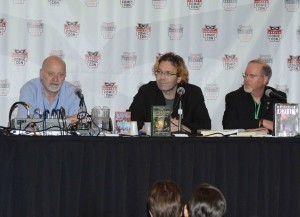 Tor Books and WordFire Press panel with David Farland, Peter J. Wacks (WFP Managing Editor), Kevin J. Anderson
Tor Books and WordFire Press panel with David Farland, Peter J. Wacks (WFP Managing Editor), Kevin J. Anderson
Dune readers are everywhere!
With LOST GIRL’s Gabrielle Villaneuve (photo by Steven L. Sears)
We had several volunteers helping us work the table, including Michelle Corsillo, Josh Vogt, Vivian Trask, Zoe Frasure, David Boop, and more. As we did at Dallas and Houston, we set up a place for fans to get their photos taken with me, and they got a free copy shared via my Official Kevin J. Anderson Page on Facebook. (At a venue where most celebrities charge $30 or more for a photo, they loved getting something free!) We took several hundred photos; here are a few samples. To see the rest, view the album on the Official Kevin J. Anderson page on Facebook
Next stop—FantasyCon and WesterCon 67 in Salt Lake City over the Fourth of July weekend!
June 18, 2014
The Cosmic SF Bundle—a lot of books for not much $$
How’s this for a deal? A wide variety of universes and futures, all in one big bundle—and you can name your own price.
I’ve participated several times in the great bundles from storybundle.com, and this new batch—the Cosmic Science Fiction Bundle—has got something (or more than one something) for every SF fan. Nine science fiction books, bestsellers, award winners, classics, short stories, grand epics—and you name your own price.
The way storybundle.com works is that a group of indie authors pool their books and help promote the whole bundle, sharing their fanbases. Readers get a great title by a favorite author, and also get introduced to other new authors. And all these indie authors get more exposure and support.
Pay a minimum price of $3 and you get six SF books in your choice of eBook format:
Frank Herbert’s classic SF thriller DESTINATION VOID
Jay Lake and Ken Scholes—METAtropolis: The Wings We Dare Aspire
Kevin J. Anderson and Doug Beason Nebula nominee—ASSEMBLERS OF INFINITY
Kristine Kathryn Rusch “Retrieval Artist” novel—ANNIVERSARY DAY
Mike Resnick, winner of every imaginable SF award, with a new collection —FIRST PERSON PECULIAR
Peter J. Wacks, mind-bending SF time travel novel—SECOND PARADIGM
But wait! There’s more! If you pay a minimum of $12 for the bundle, you get three bonus books
Brandon Sanderson, #1 New York Times bestseller with a SF short novel—LEGION
Anne McCaffrey & Jody Lynn Nye with their classic—CRISIS ON DOONA
and bestseller Michael A. Stackpole with a great SF adventure—PERFECTLY INVISIBLE
A portion of the proceeds from storybundle.com goes to a designated charity, and this time it will benefit a cause close to one of our own. Jay Lake, coauthor of METATROPOLIS in the Cosmic SF Bundle, just passed away on June 1 after a long battle with cancer. METATROPOLIS was rushed through production, and he received a finished copy of the print book less than two weeks before he died. The storybundle charity for the Cosmic SF Bundle is the Clayton Memorial Medical Fund, which Jay designated.
The Cosmic SF Bundle runs for only three weeks. Name your price, do good for a great charity, and get a batch of books that will send your imagination to the stars. (And please help us spread the word about the Cosmic SF Bundle to give a boost to indie authors and publishers.)
June 17, 2014
Teaser Tuesday— METATROPOLIS: The Wings We Dare Aspire
This week I’m giving you the introduction and sample chapter to a new book we just released at WordFire Press, written by award-winning authors Jay Lake and Ken Scholes, who were two of my writing students at Writers of the Future. I’ve done my best to mentor these two as they needed it over they years, and they’ve both become quite successful authors for Tor Books.
Jay just recently passed away on June 1 after a long battle with cancer, and we rushed METATROPOLIS through production, getting a finished copy in his hands less than two weeks before he died. This is a great, compelling SF work and I very much hope you’ll read it. It is available in all eBook formats and in trade paperback (order from amazon, Barnes & Noble, or your favorite local bookstore).
Introduction
It was in late 2007 that I proposed to John Scalzi an idea I called “The Shared Universe Project.” A group of authors would be given the same “what-if?” and write stories based in the new reality it posited. I even offered up what I thought were several clever concepts for what that operating principal might be. We then recruited a team of authors—who proceeded to boot all my ideas right out the door.
Which was the best possible thing that could have happened.
Instead, what John called “Our Little Cabal” spent an intense month building a world far richer and so much deeper than a single “what-if?” They created an all-too-possible future of zero-footprint cities, virtual nations, and armed camps of eco-survivalists. Each writer then claimed his or her own corner of this shared world to explore and wrote stories that were highly individualistic, yet fit together as a cohesive whole. Just nine months after that very first brainstorm, METAtropolis was published.
It wasn’t just the way METAtropolis was conceived and created that was unusual. Commissioned by Audible and appearing first as an audiobook original, it turned the traditional publishing cycle on its head.
Happily, the success of the original led to a sequel, METAtropolis: Cascadia (2010), and then another, METAtropolis: Green Space (2013). Along the way, the series earned the first-ever Hugo nomination for an audiobook and won the Audie Award, the highest honor in the audiobook industry. And several stories were deservedly chosen for “Best Of” and other major anthologies.
All the accolades are fantastic, of course. But, for me, the true joy of the METAtropolis franchise has been the experience of working with the best and smartest writers in the business. Even as the cast of contributors morphed from one installment to the next, and the timeline of the shared world moved forward, the overarching themes and the underlying premises remained remarkably consistent. And it was fascinating to see how the future the team created moved from one of growing despair to guarded optimism. Maybe when you live in a world for the better part of six years, it’s only natural to hope.
All of which brings me to the stories you’re about to read.
Over the three editions of METAtropolis, Jay Lake—later joined by Ken Scholes—created a story-within-the-story. It begins when a mysterious stranger called Tygre Tygre walks into the off-the-grid settlement known as Cascadiopolis—and ends many decades later when a very old man named Bashar races to save his wife, his daughter and, not incidentally, all of Seattle. I’m confident you’ll discover why Ken Scholes takes a back seat to no one as a storyteller and a world-builder—and that Jay Lake is one of the deepest thinkers in speculative fiction, predictable only in his unpredictability. For me, being able to witness their creative processes and to experience their craft first-hand has been a pleasure of the first order. (And I would be remiss if I didn’t thank Jay for taking on the additional role of Project Editor for Cascadia—and Ken for serving with him as Co-Editor for Green Space.)
So … prepare to be blown away. And once you are, I hope that you go on to savor every novel, every story, every word committed to paper (and audio!) by these two wonderful artists.
Steve Feldberg
Audible.com
March 2014
***
In the Forests of the Night
Introit
It would be nice to say that Tygre arrived in Cascadiopolis on the wings of a storm, riding the boiling front of electric darkness and lashing rain like a tall, handsome man out in some John Ford western. Or that he came through shadow and fire by a secret tunnel through the honeycombed basalt bones of these green-covered mountains, a hero out of templed legend following the journey of the gods. It would be nice, but inaccurate. Tygre arrived the way almost everyone comes to Cascadiopolis: either by accident, by judicial design or by following the damp silences between the trees higher and higher until there was nowhere left to go.
In Tygre’s case, all three.
His name was Tygre Tygre. Spelled the way Blake originally did, T, Y, G, R, E. Or, if you prefer to file it by last name as so many sentencing authorities and similar busybodies do: Tygre comma Tygre. Not that he had a file, which made him unusual for someone who wasn’t otherwise born and raised completely off the grid. But then Tygre was unusual from before we ever saw to him long after we laid him down in the forest loam beneath a simple stone marked only with a stylized flame.
Death improves everyone’s reputation. For some, it also multiplies their power.
• • •
Bashar grunts. A familiar, weary look nestles in his narrowed eyes, visible to the pickets even in the deep, green-black shadows of a Cascades evening. The men and women who stand at Cascadiopolis’ first line of defense know better than to give him cause for challenge. Not when he is in this mood.
Even the new fish like Kamila understand this with the same brute instinct that keeps young cats alive in the face of a battle-scarred neighborhood tom. Still, she is not so smart as she should be. Spiked into camo netting forty feet up a Douglas fir, she tries to sneak a hand-rolled smoke.
Cigarettes are so twentieth century, the pocket-sized equivalent of an SUV these days, but there’s been a fad for them in the cities up and down the I-5 corridor. Every generation ignores the lessons of the one before. It’s not tobacco—long haul transport is too difficult and expensive for something that doesn’t pay good Euros by the gram—but a mix of locally grown herbs and good old-fashioned ganja. Rolling papers can be sourced regionally from the old Crown Z mill up on the Washington side of the Columbia.
Everyone knows this. The old hands, meaning anyone who has been on the picket line for more than a week, also know that Bashar hates cigarettes with the same passion that he hates concrete, white people and internal combustion.
Kamila does not know this, so she clicks her sparker and takes a drag inside a cupped hand. Bashar has the hearing of a bat, they whisper to one another when the commander is on the far side of a basalt-ribbed ridgeline. He stops, pressure-rifle suddenly cocked, and without turning his head says, “Miller.”
She accidentally swallows the butt, then chokes hard on the mix of hot tip, raw smoke and an inch of lumpy paper going down her throat. “Sir,” she squeaks.
“Drop it.”
The new recruit almost says, “Drop what?”—a relic of oppositionally defiant teen-hood so recently left behind, but the absolute silence from her fellow pickets warns her. Cautiously she casts her sparker down. It hits the mossy ground with a muffled thud to be swallowed by the shadows at the base of her tree.
“The fag, Miller.” Now Bashar sounds bored. That is when he is at his most dangerous. “Drop the fag.”
“I don’t have it,” she whispers, then belches smoke and paper shards amid a searing pain in her larynx.
Still not looking over his shoulder, Bashar snaps off a three-needle burst from his weapon, which takes Kamila in the meat of her thigh. She squeaks with the agony of the non-lethal hit as the tangy reek of blood blooms among the trees.
Whatever he was going to do to her next was lost amid a startled challenge from Ward, a hundred yards downslope hunkered down behind a lichen-raddled boulder.
Her voice crackles over the dissociated network of turked comm buds, shouting, “H-halt!” A fraction of a second later the words echo through the cooling air.
Bashar moves like a mountain lion on a wounded sheep; fast, hard and silent as he makes the long descent in a dozen bounds. Ward knows better than to apologize—she is no new fish—but she has the stranger in her sights.
He is Tygre, of course, though none of us have heard of him yet, and he has walked right past the outer line of Bashar’s pickets as if they were a row of dead streetlights on some Portland boulevard. The picket commander meets the invader face to face in a rare pool of moonlight this deep beneath the spreading arms of the mountain forest.
For a moment, even this toughest of the renegade city’s partisans is lost in the mystery of the man who would be their king.
• • •
We quote from the introduction to a master’s thesis written during the last year that the Sorbonne was still a degree-granting institution:
The early decades of the twenty-first century brought the collapse of the American project. A noble experiment in democracy and economics had transitioned through imperialism, then dove straight into the same hollow irrelevancy which had seized the eighteenth century Spanish crown—a zombie empire shambling onward through the sheer weight of its extents, but devoid of initiative or credibility. Where Spain had been dogged by England in those post-Armada years, America after Reagan was hunted by a pack of baying hounds: transnational terrorists, post-NATO powers and resource-funded microstates with long-armed grudges. All this while rotting from the inside as the true failures of internal combustion-centered urbanism were finally exposed like worms in the heart of a prize bitch.
Hope was not dead, but it lived in strange, isolated colonies on the warm corpse of the United States. Astronomers listened to good news from outer space in their enclaves in Arizona, Wyoming and west Texas. Green entrepreneurs only a generation removed from South Asia and Eastern Europe clustered amid the Monterey pines of Big Sur, in the cornfields of Iowa, within sealed, half-buried arcologies along Pamlico Sound. The stochastic city blossoming hidden amid the near-ruins of Detroit, silent and extra-official as it was, prospered as no city had since the 1947 founding of Levittown unknowingly sentenced urban cores to slow death.
Cascadiopolis was an equally stealthy western answer to Detroit’s secretive rebirth. Built on Federal land, its inception funded by a handful of private philanthropists, its initial design ruthlessly controlled by a Colorado environment activist who fancied himself a latter-day Pablo Lugari blessed with a much larger canvas, the city-that-was-not-a-city hidden high in the Cascades grew not despite itself but through the sort of deliberate intent not seen in North America since Pierre L’Enfant laid out the streets of the District of Columbia. Where Washington’s diagonal avenues had been arranged to provide maximum opportunity for enfilading cannon fire to repel British invaders, Cascadiopolis defends itself in far more subtle, and effective, ways.
Tygre Tygre aimed to approach that city much as the British had approached James Madison’s Washington. Like his historical predecessors, he would set flame to the seat of power. Like them, he would ultimately fail, while the dream that was the heart city would endure.
• • •
Tygre is a tall man, like all natural leaders. We are not so far from the fruit trees of Central Africa, and the same height that confers the advantages of long-armed reach and the first glimpses of danger also helps dominate committee meetings and win bar fights. Our genes know this, far deeper even than our socialization, which only reinforces the message.
The newcomer is ambiguously colored in the pooling moonlight of the Cascades night. Bashar cannot decide for a moment exactly which species of hatred he will deploy on this intruder so arrogant as to walk straight through his brutally trained pickets. The newcomer doesn’t seem to be a white man, but neither is he safely, anonymously dark-skinned. Something weird, like Anadaman Islander, or someone from the genetic melting pots of late, unlamented West Coast liberalism.
Distrust is universal, Bashar reminds himself as he slips the muzzle of his weapon up into the soft skin at the bottom of the taller man’s chin. “Welcome to the end of the line,” he whispers.
Tygre is unperturbed, calm as a man being handed a check by a bank president. When he speaks, his voice has a timbre that could call armies to the march, bring men and woman alike to their knees, or fill an offering plate. “I rather prefer to believe this is a beginning.”
Bashar nearly shoots the man right there and then, but something stays his hand. He would be within the rules of engagement—nobody legally enters Cascadiopolis by night, not ever. “You never heard of the Granite Gate?”
That is the outpost much further down in the watershed, where the abandoned railroad spur runs out of trestle, where people with visas or deportation orders or any of a hundred essential materials cited on the ever-circulating lists can appear and apply for entry.
Even here in the heart of fog-bound anarchy, there are processes, rules, requirements to be followed. Freedom must be protected by a wall of suspicion. Only rats slip through under dark of night. They are trapped, beaten, skinned, and then hung out to rot on iron poles at the farthest boundaries of the city’s territory like shrike-impaled prey.
These measures are largely effective, making the work of Bashar’s pickets much easier.
But not tonight.
“It was not convenient for me,” says Tygre.
“Convenient,” says Bashar as if he has never encountered the word before. Despite himself, he is fascinated. No one has been so utterly unafraid of him since he hit puberty. Thirty years and a near-collapse of civilization later, Bashar’s very name is a byword for brutally effective security from Eureka to Prince Rupert.
“No.” Tygre smiles. In that moment the true force of him is revealed like diamonds being spilled from a velvet bag. Calling it charm would be like calling a North Pacific typhoon a breeze. A tall, handsome man with a voice like bottled thunder can take on armies. A tall, handsome man with a voice of bottled thunder and that smile can take over nations.
Even Bashar is set back. “We have rules,” he says weakly, a last gasp of bluff in the face of defeat. A million years of evolution have conflated with the raw tsunami of one man’s power to overcome even his profound distrust. His pressure rifle drops away from Tygre’s chin. “What’s your name?” Bashar barely swallows the “sir” hanging at the end of that sentence.
“Tygre.”
The word rolls through all the pickets on the turked comm circuit, echoes in the ears of those within shouting distance even though the man is whispering, launches into the air like the compressed chirp of an uplink releasing orbital kinetics on some unsuspecting ground site.
Some last vestige of procedure rescues Bashar from terminal embarrassment. “You have a visa, Tygre?”
“Do I need one?” His voice holds the infinite patience of a kindly god.
“Asylum,” mutters someone sotto voce in the dark.
Bashar doesn’t even seem to notice for a long, hanging moment. Then he echoes the word as if the thought were his own. “Asylum. You can claim it.”
“I claim asylum.” The gentle humor in Tygre’s voice would make a stone smile.
• • •
June 10, 2014
Teaser Tuesday: RESURRECTION, INC.
A little more than 25 years ago, I published my first novel, RESURRECTION, INC., a science fiction/gothic horror/murder mystery that was inspired by the Rush album “Grace Under Pressure.” The editor who bought that novel (and three more) for Signet Books, John Silbersack, moved over to Warner where he bought more novels from me, then moved to HarperCollins where he signed me up to write three X-Files novels…and later he became (and still is) my literary agent.
Because of the novel’s connection to the Rush album (which I mentioned in the acknowledgments of the book), I received a 7-page single-spaced letter from Neil Peart, the drummer and lyricist from Rush, and we have been friends for well over twenty years.
After the success of our novel CLOCKWORK ANGELS, published by ECW Press, I had a new opportunity—ECW offered to reissue RESURRECTION, INC in a lovely new trade paperback edition to celebrate the 25th anniversary…with a new cover by Hugh Syme—the artist who painted the original cover for the “Grace Under Pressure” album that inspired the novel in the first place, more than a quarter century ago.
I love it when serendipity comes together! Resurrection, Inc. is now available in print from ECW and in all eBook formats from WordFire Press.
In the future, the dead walk the streets—Resurrection, Inc. found a profitable way to do it. A microprocessor brain, synthetic heart, artificial blood, and a fresh corpse can return as a Servant for anyone with the price. Trained to obey any command, Servants have no minds of their own, no memories of their past lives—supposedly.
Then came Danal. He was murdered, a sacrifice from the ever-growing cult of neo-Satanists who sought heaven in the depths of hell. But as a Servant, Danal began to remember. He learned who had killed him, who he was, and what Resurrection, Inc. had in mind for the human race.
Enjoy this sample of the first chapter:
The two Enforcers found the dead man in the street, long after curfew. The city’s night hung around them, tainted with a clammy mist caught between the tall and dark buildings. The smell of fresh blood, smoke, and the sweat of close-pressed bodies drifted upward into the air.
The slain man was naked, spread-eagled inside a geometrically perfect pentagram drawn in blood. At each of the five corners of the pentagram burned candles of black paraffin, made to look archaic with artificially molded runnels of wax along the sides. A wide knife wound hung cleanly open in the center of the victim’s chest, like an appalled extra mouth.
With a throb of its rear jets, the Enforcers’ armored hovercar descended to the flagstones. As the engine purred its way into silence, Enforcer Jones, a tall and thin black man, emerged from the craft. He hung back uneasily, remaining near the hovercar. “Neo-Satanists again!” he muttered under his breath.
The other Enforcer, Frampton, agreed. “Yeah, they give me the creeps.” Belying his words, he went eagerly forward, amused and confident.
Weapons bristled from pockets and holsters on the Enforcers’ white body armor; tough helmets with laser-proof black visors covered their faces. In the mercifully brief four weeks Frampton had been assigned to him, Jones had never seen his partner’s face, yet somehow he imagined it would wear a stupid boyish grin, maybe some scattered pimples, maybe curly hair. Frampton seemed to think all this was fun, a game. It didn’t matter, though—they weren’t friends, nor would they ever be. Other Enforcers had a real camaraderie, a team spirit. But this would be Jones’s last night patrol anyway.
“Think I should put out the candles?” Frampton asked.
Jones moved away from the hovercar, shaking off his revulsion of the pentagram, the blood sacrifice. “No, I’ll do it. You see to his ID.”
Frampton retrieved some equipment from the hovercar while Jones stepped forward, methodically squashing each of the five black candles with the heel of his white boot. In the distance, through gaps between the massive squarish buildings, he could see the running lights of another patrol car moving in its sweep pattern.
Frampton made a lot of unnecessary noise as he carelessly tumbled equipment onto the flagstones within the pentagram. He picked up one of the scanner-plates and pushed it flat against the dead man’s palm. The optical detectors mapped the swirls and rivulets of the man’s fingerprints, searching for a match in the city’s vast computer network.
“Nothing on the Net about him.” Frampton double-checked, but came up with the same answer again.
“Figures,” Jones said.
“Ever wonder how the neo-Satanists manage to get people who aren’t even in the databases, every time? Weird.” Frampton sounded breathless. He was always trying to make conversation. Always.
Jones turned an expressionless black visor toward his partner for a long and silent moment. He wanted to act cold, wanted to be gruff with the other Enforcer. It was too late to make friends now—better just to keep up the act for one more night. “How do you know they don’t just alter the data on the Net?”
Frampton considered this in silent amazement. “That would be awfully sophisticated!”
“Don’t you think this is sophisticated?” Jones jabbed a hand at the body, the candles, the pentagram. “Enforcers sweep this area every five minutes after curfew. You know how strict it is, how closely patrolled—and the neo-Satanists still managed to get him out on the street, draw the pentagram, light the candles, and then vanish before we could get here.”
Only members of the Enforcers Guild were allowed on the streets of the Bay Area Metroplex between midnight and dawn. Jones didn’t fully understand the actual reasons for the curfew—he’d heard rumors of a war taking place somewhere, but he had yet to see any signs of battle. Other, more sensible people cited the occasional violent riots caused by angry blue-collars who had been displaced from their jobs by resurrected Servants.
Jones himself had participated in some of the mock street battles staged by the Guild after dark. Nobody really got hurt—the damage usually included no more than a few blasted palm trees, a handful of scorched tile rooftops, and plenty of noise in the streets. But it all sounded terrible and dangerous enough to the general public huddled in their living quarters that they would always feel grateful for the protection the Guild offered. Besides, it gave all the Enforcers something to do.
Earlier in the night, Jones and Frampton had captured a chunky Asian man cowering under the overhang of a darkened business complex. The man had been trying to hide, not knowing where to go—as if he had a chance of avoiding the Enforcer sweeps.
Frampton had pulled out two of his weapons and started toward the unfortunate man, but Jones restrained his partner and listened while the chunky man babbled an explanation. He and his wife had argued, and he had stormed out of their apartment, either forgetting about the curfew or not caring. Now his wife wouldn’t let him back in, and the man had been trying to stay out of sight until dawn.
Sheepishly the Asian man keyed his password into the Net terminal mounted in the armored hovercar; his ID checked out.
“You know what we have to do now,” Jones said from behind his visor.
The man swallowed and hung his head in dejected horror. “Yes.”
“All your Net privileges are revoked for a week. Sorry. Curfew is curfew.” The Asian man sulked behind the restraining field in the back of the hovercar while Jones and Frampton escorted him home.
Without the Net recognizing his identity, the man would effectively be a non-person for an entire week: he would not be able to buy anything, make person-to-person video or voicelinks, call up entertainment, or even enter his own home unless someone else let him in.
The man’s wife looked frightened but not surprised when the Enforcers arrived to escort her husband back into the dwelling; she didn’t look pleased to see him, and the prospect of having to do everything herself for the next seven days seemed to make her angrier yet.
* * *
Back at the murder site, Frampton opened the refrigerated, airtight compartment in the rear of the hovercar and then returned to the slain man in the pentagram. “Give me a hand here?”
Jones bent to take the body’s cold, naked feet while the other Enforcer gripped the dead man tightly under the armpits. Jones could feel the rubbery flesh of the victim’s ankles even through his flexsteel-mesh gloves.
Frampton made a deprecating snort as he looked at the mouthlike wound in the dead man’s chest. “Well, it’s off to the factory for you, my boy. I bet you’re going to miss all this excitement after your transfer, Jones.”
Transfer generally equated with punishment in the Enforcers Guild, and Jones had screwed up several days before, during a rare daytime stint on the streets. He had frozen for a moment, let his conscience whisper a few words in his ear, when he had seen a rebel Servant break from her routine and run.
All Servants were reanimated corpses, dead bodies with microprocessors planted in their brains to make the bodies move again. This allowed them to walk and talk and do what they were told. It was much cheaper than manufacturing androids from scratch to do menial and monotonous tasks.
But despite her shaved head, the lifeless pallor of her skin, and the gray jumpsuit-uniform all Servants wore, Jones had difficulty convincing himself that the rebel Servant wasn’t human, that she was already dead and merely reanimated, that she didn’t matter.
The Enforcer found the Guild’s reprimand ironic: Starting tomorrow, Jones would be switched from his easy post-curfew beat to full-time service at Resurrection, Inc., where he would escort newly resurrected Servants to their assignments.
Well, at least it would get him away from Frampton and his constant inane chatter.
They placed the slain man in the back compartment of the hovercar, folding his arms and legs to fit him into the cramped space. Holding a miniature Net keypad in his hand, Frampton punched in data about the discovery. “Verify cause of death,” Frampton said. “Single wound, no other apparent bodily damage, no identity information on the Net.”
Jones glanced at the wound in the man’s chest. “Concur.”
“To Resurrection, Inc., right?”
“Yeah.”
Frampton dropped his voice slightly. “Man, I hope that never happens to me.” Because of the dark visor, Jones could read no expression on his partner’s face.
Jones closed the compartment and set the controls for quick-freeze. A hissing noise filled the air. He knew exactly what Frampton meant, but he asked anyway, “What? You don’t want to be a neo-Satanist sacrifice, or become a Servant?”
“Neither one.”
June 5, 2014
Denver StarFest, Dallas Comic Con, Houston ComicPalooza
With a host of books coming out all at once, I’ve been going to a lot of large pop-culture shows so I can meet the fans all at once. Since March, my releases include the New York Times bestseller MENTATS OF DUNE with Brian Herbert (Tor), the humorous fantasy THE DRAGON BUSINESS (47North), the trade paperback reissue of New York Times bestseller and award-winner CLOCKWORK ANGELS, with Neil Peart based on the Rush album and the 25th anniversary special edition of my first novel RESURRECTION, INC (both from ECW), and the new Tor hardcover of THE DARK BETWEEN THE STARS, first book in The Saga of Shadows…and there have also been some WordFire Press reissues of my earlier novels.
So, yeah, a lot of reasons to hit the road, and Tor Books has been a great sponsor of my “Running Man” tour!
I started May at Denver StarFest, where the WordFire Press team helped set up and run a great table. I appeared on several panels and signed autographs.
Behind the Denver StarFest table with two other WordFire Press authors
Peter J. Wacks and Mark J. Ryan
Then it was off to Texas for two weekends in a row, first the Dallas Comic Con and then ComicPalooza in Houston. WordFire Press managing editor Peter J. Wacks and his coauthor Mark Ryan drove the big SUV crammed with books and our table setup from Colorado to Dallas, and set up and ran a spectacular booth with our crew of volunteers including Jason Macer, Heidi Berthiaume, Keisha McDaniel, and Superstars alumni Nathan Dodge, Gama Martinez, Stone Sanchez, Diann T. Read, and John D. Payne (also a WordFire author). All autographs are always free, and we also set up a new camera in front of our book banners to take photos with the fans; all copies are posted on my Official Kevin J. Anderson Page on Facebook as well as on my dedicated Events webpage.
At the end of the weekend, Dallas Comic Con was our best show ever, and we had a terrific time.
Dallas Comic Con was such a successful show, in fact, that it caused problems. When Peter and Mark loaded the truck with books, that was supposed to be enough for two shows—and we sold 70% of our books in the first weekend! I flew home in the interim (since my wife Rebecca is recovering from back surgery and I needed to take care of her!), and we rush shipped more boxes to Houston while Peter and Mark drove from Dallas to Houston. I flew back to Texas a few days later, this time with three large suitcases loaded with 70 pounds each of books (the max I’m allowed even as a high-level frequent flyer!)
Houston was a smash as well. Rebecca and I had gone to ComicPalooza the year before and knew we liked the con and the people. We had an amazing dinner hosted by fan and friend Howard Hayes where we got to hang out with four former Doctors, Sylvester McCoy, Paul McGann, Peter Davidson, and Colin Baker, as well as comics writer Tony Lee, voice artist Claire Hamilton, and actor Glenn Morshower. We also got to meet filmmaker George Giordano, Miltos Yerolemeu (Master Silvio from GAME OF THRONES, and fight choreographer for the series), and writer friends John Scalzi and Peter S. Beagle.
Yeah, it was a lot of fun!
with John Scalzi (who is impressed with our booth)
fans can’t stop reading
A dinner with four Doctors! Colin Baker, Sylvester McCoy, Paul McGann, Peter Davidson
With actor Glenn Morshower
Paul McGann shows Kevin the proper respect due to an author
Miltos Yerolemeu demonstrates a proper Game of Thrones death scene
Back home from Texas now for a week and a half, but not much rest. I have just arrived in the beautiful mountain town of Crested Butte, Colorado, where I am a guest instructor at the Crested Butte Writers Conference, and then next weekend we’ll be exhibiting at the Denver Comic Con—come and see us!
June 3, 2014
Book Release Day: THE DARK BETWEEN THE STARS Preview!
I have always considered my Saga of Seven Suns to be my masterpiece—a huge story that brings together all the ingredients I love so much about Science Fiction. It is, in effect, my love letter to the genre.
The last book in the initial seven book saga, THE ASHES OF WORLDS, was released in 2009, but even when writing that long series—eight years of my life!—I planted the seeds for a foll0w-on story, a next-generation trilogy called The Saga of Shadows. Today, book 1, THE DARK BETWEEN THE STARS, was released in hardcover by Tor Books (will be out in two days in the UK from Simon & Schuster).
THE DARK BETWEEN THE STARS is set twenty years after the end of ASHES, with a whole new generation of main characters as well as some old favorites. It is written as a standalone, so you don’t need to read the original Saga. If you’re a new fan or an already-convinced one, I hope you enjoy this book. I really love it.
And, news flash, I am over half finished with book 2 in the trilogy, BLOOD OF THE COSMOS.
For a standalone novella in The Saga of Shadows, you can read “Island in a Sea of Stars” (part of THE DARK BETWEEN THE STARS) free at tor.com.
Or, if you want to sample the novel itself, here are the first two chapters:
From the introduction to An Initial History of the Elemental War, by Rememberer Anton Colicos:
People assume that historians want to witness seminal events, but I must disagree. As a historian, my task is to record, to understand, to be objective. Yet objectivity is elusive when one is in the thick of a war that devastates the entire Spiral Arm. Personally, I would rather be an observer than a participant.
Nevertheless, while living through the conflict we now call the Elemental War, I did acquire a unique perspective. Now that I look back over the two decades since the end of that war, I see a time of peace and recovery. Civilization across the Spiral Arm is catching its breath.
The fiery beings called faeros have been driven back into their suns; the hydrogues are contained within their gas-giant planets. The Klikiss insect race departed on their final swarming, disappearing through their mysterious network of transportals to uncharted planets, and their treacherous black robots have all been wiped out.
The corrupt Terran Hanseatic League has become the Confederation, ruled by King Peter and Queen Estarra and composed of former Hansa planets, independent worlds, Roamer clans. Although Earth remains important to the human race, the Confederation’s capital is Theroc, where the worldforest thrives and telepathic green priests tap into the vast knowledge stored in the sentient trees.
The Ildiran Empire is still humanity’s closest ally, and I admit to a fondness for their race and culture, having spent most of my professional career translating their billion-line historical epic, the Saga of Seven Suns. The Mage-Imperator even keeps a human green priest as his consort.
Impatient readers might consider twenty years plenty of time to chronicle even such sweeping events, but in truth we are just getting started. It will take decades of peacetime contemplation to sort out the details.
If only we had that luxury. . . .
1
GARRISON REEVES
He had to run, and he fled with the boy out into the dark spaces between the stars.
Garrison Reeves stole a ship from the Iswander Industries lava-processing operations on Sheol. Though he’d planned his escape for days, he gathered only a few supplies and keepsakes before departing, careful not to give his wife any hint of what he intended. None of his possessions at the facility mattered more than getting safely away with his son.
He knew the disaster could come soon. Lee Iswander, the Roamer industrialist, dismissed Garrison’s concerns about third-order tidal shifts in the broken planet; Garrison’s own wife Elisa didn’t believe him. The lava miners paid little attention to his warnings, not because they disputed his geological calculations, but because they didn’t want to believe. Their priorities were clear. Adding “unnecessary” and expensive levels of redundant shielding and “paranoid” safety measures was irresponsible, both to Iswander Industries and to the employees, who participated in profit-sharing.
Lee Iswander had commissioned follow-up reports, biased reports, that painted a far rosier picture. Garrison didn’t accept them.
So he made his choice, the only possible choice. He stole one of the company ships, and when she found out Elisa would claim that he stole their son.
He flew out of the Sheol system, running far from any Roamer settlement or Confederation outpost. Elisa was not only an ambitious woman, she was abusive, tenacious, and dangerous—and she would come after them. He needed at least a head start.
The ship was a standard Iswander cargo transport, a workhorse, fully fueled with ekti, run by an efficient Ildiran stardrive. Garrison could fly the vessel without special training, as he could fly most standard spacecraft.
Ten-year-old Seth rode in the cockpit next to him. Garrison made a game of familiarizing the boy with cockpit systems and engine diagnostics, giving him simple navigation problems to solve—as any good Roamer father would, even though Garrison had chafed under how his stern father had raised him. He would not make the same mistakes with Seth.
Roamers were free spirits, sometimes deprecatingly called space gypsies, whose clans filled niches too rugged and dangerous for more pampered people—such as the Sheol lava-processing operations. He had followed Elisa there for her advancement in Iswander Industries.
“You should stay away from That Woman,” Olaf Reeves had warned him, not once but dozens of times. “If you defy me, if you marry her, you will regret it. You are spitting on your heritage.”
Now, Garrison hated to admit his father had been right.
He closed his eyes, took a breath, and opened them. He studied the markers on the ship’s copilot control panels, then turned to his son. “Go ahead and set the next course, Seth.”
“But where are we going?”
“You pick, so long as we’re heading away from Sheol.” He tapped the starscreen, which showed infinite possibilities. “On this trip, we’re truly roaming. I just need some time away from everybody so I can re-think things.”
Though anxious, the boy was glad to be with his father. Seth respected his mother, even feared her, but he loved his father. Elisa never let down her walls—not with any business associate, not with Garrison, not even with her own son.
“Will I be able to go to Academ now?” Seth asked. The Roamer school inside a hollowed-out comet had always fascinated the boy. He wanted to be with the children of other clans, to have friends. Garrison knew his son would be happier at Academ, but Elisa had refused to consider sending their son there.
“Maybe we can arrange that before long. For now, you can learn from me.”
Unlike other Roamer children, Seth hadn’t grown up in a pleasant domed greenhouse asteroid or on the open gas-giant skies of an ekti-harvesting skymine. Rather, his daily view was a blaze of scarlet magma erupting in a smoke-filled sky. All the personnel of the lava-mining facility lived in a reinforced habitat mounted on pilings sunk down to solid rock. More than two thousand employees, specialists of various ranks—engineers like Garrison himself, metallurgists, geologists, shipping personnel, and just plain grunt workers—filled shifts aboard the smelter barges or control towers, surrounded by fires that could have inspired Hell itself.
No other parents kept their children here. Sheol was no place for a family, no home for a boy, regardless of the career advancement opportunities for Elisa.
As the two closely orbiting halves of the binary planet adjusted their dance of celestial mechanics, Garrison had analyzed the orbital pirouette, uncovering fourth-order resonances that he suspected would make the fragments dip fractionally closer to each other, increasing stresses. He studied the melting points, annealing strengths, and ceramic-lattice structure of the habitat and factory towers. And he realized the danger to the Iswander operations.
Alarmed, he had presented his results to Lee Iswander, only to be rebuffed when neither the industrialist nor his deputy—Garrison’s own wife—took his warnings seriously. Iswander impatiently told Garrison to go back to work and reassured him that the lava-processing outpost was perfectly safe. The material strength of the structural elements was rated to withstand the environment of Sheol, although with little margin for error.
When Garrison insisted, though, Iswander grudgingly brought in a team of contract geologists and engineers who found a way to re-run the calculations, to reaffirm that nothing could go wrong. The specialists had departed with surprising haste—for safety?
Garrison still trusted his own calculations, though. Next, he felt it was his responsibility to warn the Sheol employees, which infuriated Elisa, who was sure that his whistle-blowing would cost her a promotion.
Honestly, Garrison hoped he was wrong. He knew he wasn’t. Convinced he had no alternative, he decided to take Seth away from Sheol before disaster struck. . . .
After scanning the star catalog, the boy chose coordinates that qualified as little other than “the middle of nowhere.” The stardrive engines hummed and changed tone as they adjusted course, and the vessel streaked off again.
Seth looked up at him with a sparkle in his eyes. “If we had our own compy, Dad, he could fly the ship, and you and I could play games.”
Garrison smiled. “We’re on auto-pilot. We can still play games.”
Because there were no other children on Sheol, Seth had longed for a competent computerized companion, probably a Friendly model who could keep him company and amuse him. At the lava-mining facility, Lee Iswander used only a handful of Worker compies, none of which were the more sociable types, not even a Teacher compy.
“Your mother didn’t see the point in owning a compy,” Garrison said. “But maybe we can revisit that.” After we see what happens.
In his head, Garrison heard his father’s gruff voice again. “You never should have married That Woman. You’re a Roamer, and you belong with other Roamers!”
“Elisa’s not a Roamer, but Lee Iswander comes from a good clan,” he had responded, though the words sounded flat in his own ears.
“That man has more of the Hansa about him than the clans. He’s forgotten who he is.” The bearded clan patriarch had waved a finger in front of his son’s face. “And if you stay with him, you will forget who you are. Too many Roamer clans have forgotten. A knife loses its edge unless it is sharpened.”
But Garrison had refused to listen and married Elisa Enturi anyway. He’d given up so much for her . . . or had he done it just to act out against his father? He had wanted a family, a fulfilled life, and Elisa wanted something else.
“If we find a place and settle down, will Mother come to live with us again?” Seth asked.
Garrison didn’t want to lie. He stared out at the forest of stars ahead and the great emptiness in which they had lost themselves. “She wants to take her chances at Sheol for now.”
The boy looked sad but stoic. “Maybe someday.”
Garrison could not envision any other answer but Maybe someday.
Still running, they crossed the expansive emptiness—and then unexpectedly stumbled upon an amazing anomaly: a cluster of gas bags far from any star system, each bloated globule was twice the size of their ship.
Garrison ran a quick diagnostic. “Never seen anything like these.”
The membranous bubbles drifted along in a loose gathering with nothing but light years all around them. In the dim light of faraway stars, the spherical structures appeared greenish brown, and each filmy membrane enclosed a blurry nucleus. Hundreds of thousands of them formed an island in a sea of stars.
Seth studied both the sensor screens and the unfiltered view through the windowport. “Are they alive?”
Garrison shut down the engines so their ship could drift toward them. “No idea.” The strange objects seemed majestic—silent, yet powerful. Organic? They filled him with a sense of wonder. “They remind me of . . . space plankton.”
“They’re bloated and floating,” Seth said. “We should call them bloaters.”
A random glimmer of light brightened one of the nodules, an internal flash that faded. Then another bloater flickered and quickly faded.
Close together at one of the windowports, they stared out at the view. “If we discovered them, we can name them whatever we want,” Garrison said. “I’d say bloaters is a good name for them.”
“So we just made a discovery?”
“Looks that way.” He moored the ship among the thousands of silent, eerie nodules. “Let’s stay here for awhile.”
2
ELISA REEVES
Elisa was so furious and indignant she could barely think straight, but she had enough common sense to maintain her composure in a business setting. She stifled her instinctive reaction and wore her professional demeanor like armor.
She could not let Lee Iswander see her as weak. There was too much at stake, and her responsibilities were too great. Her kidnapped son and her husband’s betrayal were only part of what she had to worry about. Priorities had to be weighed and balanced.
He took my son! He stole a ship, and he left me behind!
Even before she’d married Garrison, she had known he was a backwards bumpkin, but together, they had agreed on a plan. He said he would follow it, keep his eyes on his silly Guiding Star, trusting that it would change everything for them.
And Elisa had believed him. That made her as angry as anything else. She had believed him. She hated to feel like a fool.
Now, Elisa approached the door to Iswander’s office, in Tower One of the Sheol lava-processing facility. Standing high on carbon-reinforced ceramic struts, Tower One held five decks of offices and habitation spaces. Scarlet lakes oozed up from molten springs to form a shimmering—some called it terrifying—panorama all around them.
Elisa straightened her uniform outside of Iswander’s office and took a moment to compose her expression. She smoothed a hand over her short, professional-length auburn hair with highlights of gold. When she was ready, she entered.
Lee Iswander was busy, an important man, but he always had time for her. As far as she could tell, the industrialist didn’t hold her husband’s irresponsible behavior against her.
Iswander stood with impeccable posture before the wall of thick polarized windows that looked out upon Hell. His dark suit fit him well. A frosting of gray at the temples of his dark brown hair gave him a distinguished look, a man who inspired respect and confidence at first glance. As a boss and a business leader, he automatically knew what he was doing and thus was able to convince armies of middle managers and employees to do as he asked. People trusted him when he made a business decision or took a corporate gamble. Elisa believed in him too.
Turning from the window, he welcomed her with a smile. “Pannebaker says there’s a new roostertail forming. He’s heading out to the hot spot to get images. You know how he is with fresh geological activity.”
Elisa also knew how dangerous that was. “Did he sign a waiver?”
“He’s signed numerous waivers. He hasn’t managed to kill himself yet.”
“Then you’re set, sir.” Elisa took her place beside him at the wall of windows.
The lava flowed in slow-motion waves, their swells and dips caused by seismic instabilities. A reinforced landing gridwork stood in the middle of the three habitation and control towers. Armor-hulled smelter barges drifted on the molten sea, scooping up metals, separating out the valuable ones, and vomiting the detritus back into the pools.
The cratered other half of the binary planet filled much of the sky, tidally locked with the main body of Sheol. The two planetoids fell toward each other, orbiting around a common center of mass. The stresses squeezed and pushed the crust in a gravitational tug of war. Garrison claimed to have discovered that the broken planet was unstable—brilliant observation! It was the very instability that kept all the hot raw material flowing for easy industrial extraction. Beyond that, he was being an alarmist, looking for problems rather than solutions.
Right now, Iswander seemed preoccupied. Though Elisa wanted to explode with her news about Garrison—to scream, “My son has been kidnapped!”—she forced herself to remain calm. Lee Iswander was her best ally.
He turned to her and touched the front of his jacket. “New suit for my speech at Newstation in two days. Specially tailored. I want to cut the figure of a leader when I give my speech to the Roamer council. What’s your impression?”
“I’m not a fashion consultant, but it’s a good look. You always look like a leader, sir.”
Iswander did not hide his smile well. “I don’t ask my wife for her opinion on these things because she always dithers and says it’s fine. I wanted an honest answer.”
“I give you an honest answer every time. When you present yourself, the Roamers will see that you are a businessman and a leader, not some sloppy worker who shuffled off a production line. Your opponent won’t even bother to change out of his jumpsuit. I expect the decision will be obvious.”
“Then I accept that. Sam Ricks cannot possibly believe he has a chance of winning, although there are some clan members who prefer their eccentricities to the reality of business and politics.” He frowned.
“Roamers are a dying breed,” Elisa said, thinking of her husband and his backward family. Garrison had already caused so much trouble. She searched for a way to tell Iswander, but he was obviously preoccupied.
“I’ve been looking at the records of the Roamer clans, studying their interactions with the Confederation government—the concessions we’ve received, the inroads we’ve made. Even though you married a Roamer, I’m not sure you understand the mindset, Elisa: clan connections, seat-of-the-pants innovations, personal promises and barter, exchange of favors. My business model takes us away from those old, inefficient ways. It’s time for the clans to get serious. I truly believe that I’m best qualified to be the next Speaker.”
Even with the concern about Garrison and Seth weighing on her mind, Elisa realized in a broader sense that Lee Iswander’s advancement as Speaker would open up many opportunities for her. Caught up in his governmental role, he would need to delegate the Sheol operations, put her in charge. “Having watched Roamer politics from the outside, I’d say anything would be better than Isha Seward, sir.”
He gave her a wry frown. “That’s not exactly a ringing endorsement.”
“You’re obviously the stronger candidate, sir. It goes without saying.”
“But the clans need it said. Isha Seward was just the interim Speaker after Del Kellum retired. She knows it, and everybody knows it. She was chosen as a compromise candidate because she was lackluster and didn’t offend anyone. Now it’s time for vision, and I’ve certainly proved myself.” He chuckled. “Sorry, I shouldn’t be giving you my speech.”
“The election’s only a few weeks away,” Elisa said.
He went back to his desk where reports streamed across the datascreens embedded in its flat surface. “If I’m going to be elected as the next Speaker I’ll have to keep in touch everywhere, in real time. Not just through business shuttles, like I have now. Maybe I should bring a green priest here.”
Elisa nodded. “Many have hired themselves out, and they take oaths of confidentiality. A green priest stationed here with a treeling could be in instantaneous contact with every other green priest at any other outpost, ship, or settlement. Would you like me to look into it, sir?”
“I doubt it would do any good.” He swiveled in his chair to look out at the oceans of turbulent magma. “They prefer to be back on their forested world—or at least in a more hospitable place than this. All this fire and lava would make them nervous.”
Elisa made a note in the back of her mind that she would put forth an inquiry; perhaps with a sufficient financial incentive, she could find an open-minded green priest who would be willing to move to Sheol. But she couldn’t devote her time and energy to solving that problem until after she tracked down Garrison and got Seth back. It was time to tell Iswander.
She struggled with her sense of failure, as well as the guilt of knowing that this unexpected matter was going to take her away from her work. Before she could make her request, though, Alec Pannebaker broke in on the comm. “The plume’s about to burst, Chief. Right on schedule, right on target. I’m getting images that’ll take your breath away!”
Elisa felt tremors in the deck of Tower One, and moments later they calmed down. Sheol was in a constant restless slumber on an unquiet seismic bed.
Out on the lava lake near Pannebaker’s small shielded craft, a large bubble became a spurting geyser of lava. It sprayed high, then rained down in a roostertail. Pannebaker whistled as he withdrew his shielded boat. “Those will make great PR images!”
Iswander sounded skeptical. “‘Come to Sheol and see the sights’?”
“No, Chief—I was thinking more of how it shows you’re a visionary with the foresight and the balls to establish a viable industry where other Roamers feared to tread. No one can argue with your profit reports.”
“It might be good for your Speaker campaign, sir,” Elisa said after the deputy signed off. “But you should delete the part about the balls.”
As Iswander returned to his desk, Elisa stood straight-backed, anxious. She had never brought personal problems to him before. Finally, she said without preamble, “Garrison’s gone, sir. He stole one of your ships.”
Iswander sat back. “What are you talking about?”
“He left between six and ten hours ago. He kidnapped our son and flew off.”
“I can’t believe your husband would do that. He seemed like such a . . .”
“Passive man?” Elisa said. “Yes, he fooled me too.”
“I was going to say ‘good father.’ Is he still insisting that we’re operating too close to safety margins? It’s nonsense. We’ve been here for years without any mishap, and the recent structural scans should have put all concerns to rest.”
“He thinks the seismic make-up of Sheol is changing, and the old calculations are no longer valid.”
Iswander was disturbed. “My consultants doublechecked their test results and disproved your husband’s concerns. Even so, he riled up the other workers. If they find out he’s left, they’re going to demand answers—and I don’t need nervous work crews.”
“I suspected he might be plotting something.” Elisa focused more on her specific problem than on the overall question and its impact on Iswander operations—which demonstrated just how rattled she was. “I could tell by his mannerisms. Garrison can’t keep a secret to save his life.”
“Do you have any idea where he’s gone? For a man to steal a child away from his mother is . . . not a good thing, not a good thing at all.”
“Good thing I was suspicious, sir. He checked the Iswander ships, saw which ones were fueled and supplied. Garrison thought he was being discreet, but I rigged tracers on all vessels. No matter where he goes, each time he stops and changes course, it’ll drop off a tiny signal buoy and squirt a message with his new coordinates.” She fought with the dryness in her throat. “I can track him, sir, but I’ll need to leave right away. He’s got a head start.”
Iswander folded his hands on his desk. “You’re one of my most important employees, Elisa.”
She thought he was going to refuse her request. “I understand this is a critical time for Iswander Industries, sir. You’re just leaving for Newstation—”
His expression softened. “And I understand that this is even more important. Choose a ship of your own, any one you like—you’ve earned it. I’ll inform the other team leaders that you’re taking an unspecified amount of time for a personal matter.”
Elisa should have felt relieved, but her anger wasn’t dampened, merely focused. “Yes, Mr. Iswander. This is definitely personal.”
June 1, 2014
Jay Lake
If you know the name in the title, then you know what this post means. If you don’t know Jay, you should check out his work.
Jay told me to my face that he didn’t expect he would last beyond June. When his friend and coauthor Ken Scholes worked with me to get their collaborative book METAtropolis: The Wings We Dare Aspire rushed through publication at WordFire Press, he was sure we didn’t have much time. Jay died this morning, June 1, after a very long and very public battle with cancer.
I am very pleased that I was able to get his book out in time, a book that we suspected—but hoped otherwise—would be Jay’s last book published in his lifetime.
Here is my foreword to METAtropolis, which was just released officially last week.
Sometimes it just sticks with you.
It was at the Beverly Hills Hotel in 2003, the glitzy black-tie Writers of the Future Awards ceremony, where I presented the trophy to a young writer named Jay Lake. Jay stood up to receive his award—and gave one of the most moving acceptance speeches I have ever heard.
In a ballroom crowded with such science fiction luminaries as Robert Silverberg, Anne McCaffrey, Larry Niven, Jerry Pournelle, and many others, Jay described some of the grandest moments in human history, then made the point that the only reason anybody remembers them is because a writer was there to tell the story.
I have been a judge and guest instructor for Writers of the Future since 1996, and Jay was among my students in that year’s workshop group. Many of the newer writers I’ve taught go on to become successful, while others vanish into obscurity. When you teach a workshop group, you can never identify which will be which. But with that speech, Jay Lake certainly stuck with me.
Two years later, in 2005, at the Writers of the Future workshop and awards—this time held at the Seattle Science Fiction Museum adjacent to the Space Needle—one of the students was a gregarious and personable man named Ken Scholes. He took the opportunity to strike up a conversation with me, and I soon learned his real ulterior motive—that his wife Jen was a huge fan of my Star Wars novels, and he wanted to earn marital brownie points by introducing her to me.
Shortly after that event, Ken wrote to ask if I would consider writing a blurb for a small-press collection he was about to release. I have every incentive to help former students, and as a rule I say that they can ask me—once—for such a favor. I considered Ken’s request and asked if he was certain he wanted to use up his one favor for a small press collection. Having read his work, I expected much bigger things from Ken, and I advised him it would be better to hold off so that I could give him a quote for a major project. Ken listened to my advice … and only a few months later he sold a five-novel series to Tor Books. (And, yes, I gave him a quote on that one.)
Over the years I watched the careers of Jay Lake and Ken Scholes blossom, each of them becoming quite successful. My wife Rebecca Moesta and I gave lectures on professionalism at various science fiction conventions, how to talk, act, and dress like a pro. Jay would often pop in and stand there flaunting his trademark garish Hawaiian shirt. But that was his look and his brand, so Rebecca and I started incorporating him into our talks, too.
I followed with great concern as Jay revealed his diagnosis of terminal cancer; he rallied the whole science fiction community in his very public battle against the terrible disease. I contributed what I could, donating high-end one-of-a-kind items to fundraisers so that Jay could try new treatments, get a complete map of his genome, and embark on other innovative strategies. Despite Jay’s superhuman efforts, the cancer proved to be his kryptonite, and he was left with a ticking clock.
At Seattle’s Norwescon in 2013, Jay felt well enough to attend some of the events, and I spent a long time talking with him at a party one evening. The following morning I had breakfast with Ken Scholes, just so we could catch up.
At the time, I was just launching WordFire Press, and like a proud parent I was happy to show Ken some of our titles, which included not only my own backlist but a fairly impressive roster of other writers including Dune author Frank Herbert, Pulitzer Prize winning Allen Drury, along with Bill Ransom, Brian Herbert, Neil Peart, and others.
Ken and I talked about Jay, and he told me about the sprawling METAtropolis project they were working on in novella-length chunks. Jay and Ken have a significant track record with large publishers and certainly had no need to consider a relatively small independent operation like mine. After breakfast, Ken and I parted with a vague promise that we would have to do something “someday.”
But Jay’s clock kept ticking. The METAtropolis series gained a fair amount of attention when they were released as audio originals, and both Jay and Ken really wanted a nice print edition. In glacial traditional publishing, however, a book takes 1–2 years on average to go through all the steps of publication and release. With Jay’s declining health, that simply wasn’t acceptable.
In an email exchange I pointed out to Ken that WordFire Press operates under a different paradigm, with a much shorter time frame. He and Jay convinced their agent to go with WordFire—and here, only a month after the deal was signed, is the print and eBook edition of METAtropolis: The Wings We Dare Aspire.
I’m proud of these guys, and I’m very pleased to be their publisher. I hope you enjoy the book.
—Kevin J. Anderson
P.S. We were able to get a finished copy of the book for Jay to see in his hospice room, less than two weeks before he passed away.

